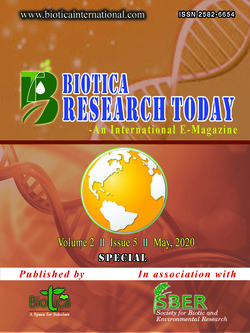
A Preview on the Production Technologies of Biochar
Debomita Dey*
Dept. of Agricultural Chemistry and Soil Science, Bidhan Chandra Krishi Viswavidyalaya, Mohanpur, Nadia, West Bengal (741 252), India
Trina Adhikary
Dept. of Fruit Science, Punjab Agricultural University, Ludhiana, Punjab (141 004), India
DOI: NIL
Keywords: Biochar, thermochemical conversion, pyrolysis, production
Abstract
Of late, biochar has received immense global importance as an organic amendment in the field of sustainable agricultural waste management for soil improvement, C accretion and environmental management. Production of char from the biomass and biogenic wastes is reviewed and it was found that among few well established thermochemical technologies for the conversion of biomass into high energy char along with oil and gaseous yield, pyrolysis is the most studied and discussed technique in the recent past. Yield of the biochar depends upon the biomass composition like moisture content and presence of cellulose or lignin. Besides, pyrolysis process parameters such as temperature, heating rate, residence time etc. also influence the biochar yield.
Downloads
not found
Reference
Abdelhafez, A.A., Li, J., Abbas, M.H., 2014. Feasibility of biochar manufactured from organic wastes on the stabilization of heavy metals in a metal smelter contaminated soil. Chemosphere 117, 66–71.
Chowdhury, Z.Z., Pal, K., Yehye, W.A., Sagadevan, S., Shah, S.T., Adebisi, G.A., Marliana, E., Rahman, F.R., Rafie, J.B., 2017. Pyrolysis: A Sustainable Way to Generate Energy from Waste. Intech 3-36.
Lehmann, J., Rilling, M.C., Thies, J.E., Masiello, C.A., Hockaday, W.C., Crowley, D., 2011. Biochar effects on soil biota – a review. Soil Biology and Biochemistry 43, 1812-1836.
